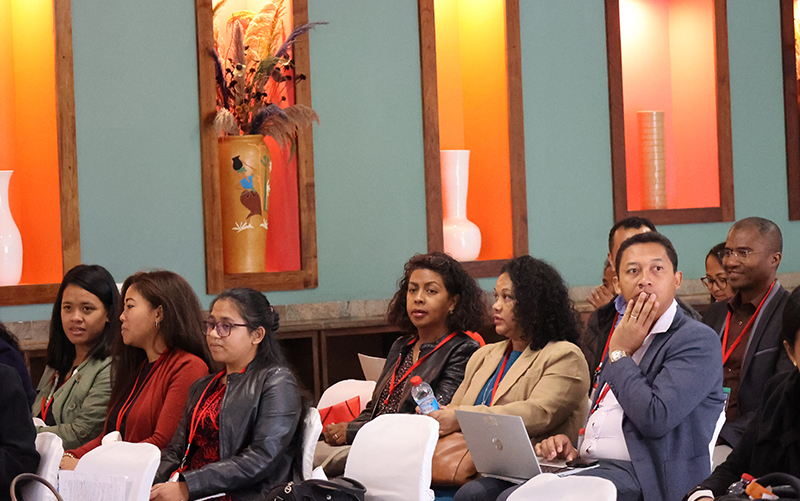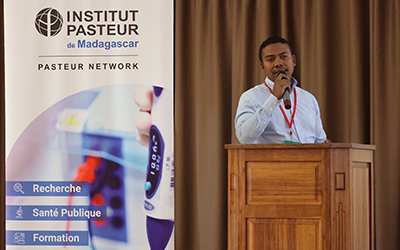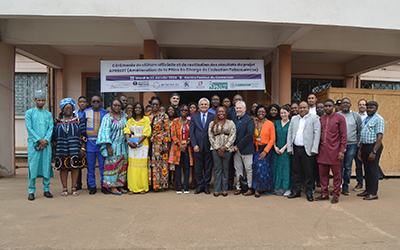
Participants at the closing ceremony at the Institut Pasteur in Madagascar
APRECIT concentrates its efforts on a crucial yet often neglected issue: the detection and management of latent tuberculosis infection (LTBI). These actions are essential for the prevention of the active disease in regions where TB remains a major threat to public health.
As such, the project assessed the cost effectiveness of several sustainable LTBI screening and management strategies tailored to the socio-economic realities of Madagascar and Cameroon. A community program was rolled out to identify the people most vulnerable to TB, in particular household contacts of known cases. Thanks to active screening carried out by two-person teams consisting of a nurse and a Community Agent for Active Case-finding in Cameroon and a Clinical Research Officer in Madagascar, the project was able to effectively target beneficiaries of preventive treatment.
This yielded significant scientific results. In fact, the combined use of intradermal reaction to tuberculin (IDR) and Interferon-Gamma Release Assays (IGRAs), such as QuantiFERON-TB Gold Plus and T-SPOT.TB, made it possible to accurately assess exposure to TB and the risk of developing the disease. This method revealed that almost half of the household contacts tested had a positive IGRA test, underlining the importance of targeted intervention.
The analyses of screening test performance showed that contacts with a positive IDR at inclusion were four times more likely to develop active TB, suggesting that the quantitative value of the IDR could be a simple and effective tool for identifying beneficiaries of tuberculosis preventive treatment (TPT). Similarly, IGRA results at inclusion were significantly higher in individuals who developed the disease, indicating that these tests could help identify people for preventive treatment.

Closing ceremony in Madagascar
Ultimately, thanks to APRECIT, 2,084 people, including index cases and household contacts, have benefited from a significant improvement in their quality of life. The project has also helped to build TB research and management capacity in both countries, with over 50 professionals trained in community intervention and IGRA testing.
Rakotondrazanany Haro Lalaina, head of Madagascar’s National Tuberculosis Control Program, shares her observations: “The PNLT’s fundamental strategy has mainly been centered around the active identification of TB cases, with particular attention paid to examining certain contacts, especially children aged between 0 and 14. Thanks to the APRECIT project, the National Tuberculosis Control Program has been significantly enhanced. The Ministry of Public Health is currently committed to a proactive screening phase, targeting cases of latent tuberculosis infection (LTBI), to further control the spread of the disease. Given the project’s success, I strongly recommend extending the research to the most isolated regions of Madagascar, where the need is greatest, and where the lack of data hinders the development of effective control strategies.”
Dr. Niaina Rakotosamimanana, head of the IPM’s Mycobacteria Unit and scientific manager of the APRECIT project in Madagascar, stresses the importance of rigorous monitoring on behalf of the PNLT, despite the financial challenges: “The critical data provided by the APRECIT project could convince donors and funders to support concrete interventions. The international and local collaboration, particularly with the Mérieux Foundation and the CPC, was incredibly rewarding, despite the obstacles encountered at the start of the project, including the Covid-19 pandemic and data that was initially inaccurate. Our gaze now turns to the future with APRECIT Bis, which aims to exploit the biobank collected and to extend the project to more regions of Madagascar, and hopefully to other African countries.”

Closing ceremony in Cameroon
As the project draws to a close, the focus will be on sustaining what has been achieved as well as implementing the LTBI screening and monitoring strategies that have been created. APRECIT’s success provides a scalable model for other regions with high TB prevalence. Moreover, it underlines the importance of innovation and cross-sector collaboration in the fight against this disease.
The Mérieux Foundation and all the partners involved remain dedicated to the ongoing effort to eradicate tuberculosis, building on the solid foundations established by the APRECIT project.
